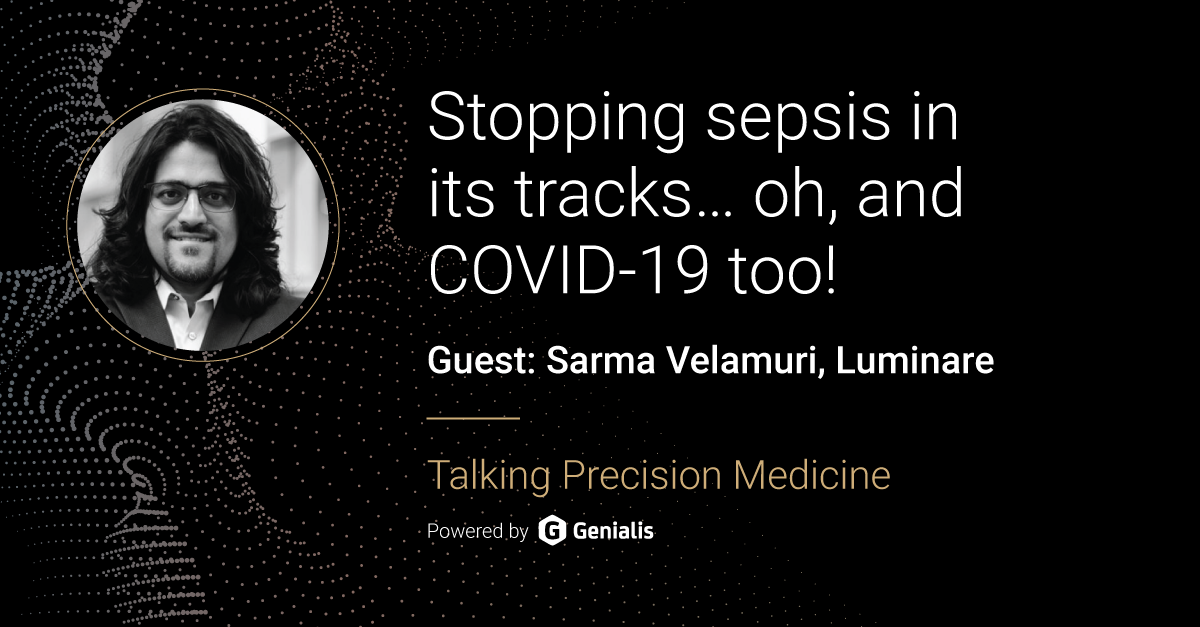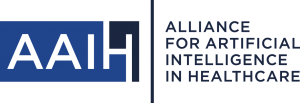Welcome to the Talking Precision Medicine podcast. In this series, we sit down with experts on the application of AI and big data analytics in the drug discovery space. Our guests are innovators, business decision makers and thought leaders at the intersection of data and therapeutics. We discuss the promise, practice, challenges, and myths of AI in precision medicine. This show is brought to you by Genialis, and Rafael, our CEO, is your host.
Genialis is focused on data integration and predictive modeling of disease biology to help accelerate the discovery and de-risk the development of novel therapeutics.
Today Rafael is joined by Dr. Sarma Velamuri, founder and CEO of Luminare. Luminare is a Houston-based digital health company dedicated to ending sepsis—the number 1 cause of death in US hospitals. In the conversation that follows, Dr. Velamuri explains how Luminare saves lives by streamlining hospital workflows, and by changing the behaviors of nurses and doctors. They’ve also made a giant leap into covid tracking, emerging as national leaders on this front.
Let’s get right to it.
Links:
- Sarma Velamuri on the Cognicast podcast
- Luminare homepage: Sepsis Detection and Treatment – best in class software
Episode highlights:
- Sepsis is the no.1 cause of death in US hospitals.
Sepsis is the no.1 cause of maternal fetal death globally.
Sepsis is the no.1 cause of chronic organ failure that is preventable.
Sepsis is the no.1 expense in patient stays in the hospital.
Sepsis is the no.1 cause of readmissions to the hospital. - US is spending about 15 billion a year on sepsis annually.
800 people/per day die of sepsis today in the US. - Sepsis is a very heterogeneous shape-shifting disease, people say sepsis and they usually mean infection, but it’s more than that – it’s a body’s abnormal response to an infection. The response of the immune system is sometimes completely out of proportion to the infection and that ends up killing the person. It also looks different in different people, which means we are dealing with a group of syndromes.
- In terms of mortality it’s 10 times worse per hour if a patient develops sepsis than if she undergoes open heart surgery. Every hour that the response is delayed the long term mortality rate goes up by 10%. It’s all about workflow and how quick the doctor’s response is.
- The initial problem Dr. Velamuri was facing was that the workflow with a patient in a hospital was broken. Experienced nurses were taking care of a patient that was clearly headed towards septic shock but nobody noticed because the symptoms were only showing up in the computer results and the nurses simply didn’t yet have the time to review those results. The information was hiding in plain sight.
- After a friend lost his child to sepsis he decided to start a company that will really tackle this problem by developing a workflow software solution (named Sagitta) that is used to create a suitable process in a hospital.
- Luminare’s solution produces an actual measurable clinical and financial change. The software itself has already been used over a 100,000 times to this day on real patients which conservatively translates to about 200 lives saved. In the last two years not a single patient that has been monitored with Sagitta software has died of sepsis. They have also noted a decrease in all cause mortality since the solution is more about the workflow implementation rather than simply deploying a new software.
- Luminare’s solution is a workflow optimization system rather than an alarm medical device system. All alarms are useless if you can’t guarantee that the patient gets treatment. This also opens the door for development of smart systems that improve patient outcomes (e.g. antibiotic treatment monitoring) and have a financial benefit.
- Sagitta software uses ML algorithms to ensure sepsis data integrity. Based on a previous agreement between Luminare and CDC to carry out a showcase for infectious diseases, Luminare’s algorithms were later found suitable for performing COVID-19 self assessments. In the early days of the disease, anyone who needed testing for COVID-19 in Houston had to go to their tool and self assess in order to get a serial number that then referred them to a testing site based on their ZIP code. This was done for about 180,000 people.
- Luminare is the only company at the moment that also offers an end to end solution for syndromic surveillance for companies and employees, that enables people to go back to work safely in the face of coronavirus pandemic.
- “We don’t sell mortality benefits, we sell workflow solutions. We’re not a software company – we’re a behavioural modification company, a UI company and a customer success company masquerading as a software company. The ‘aha’ moment with our customers usually comes with a behavioural change.”


